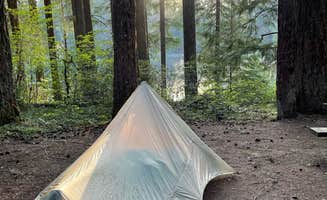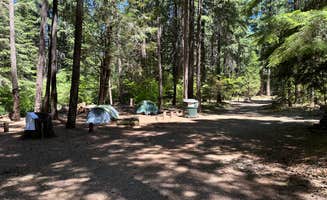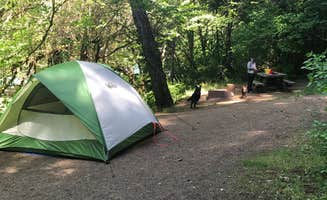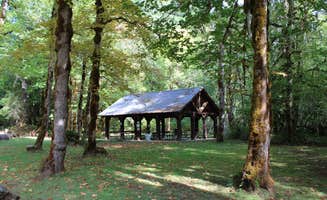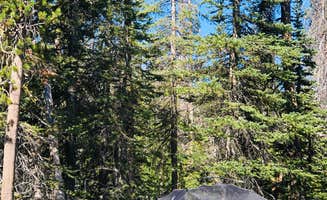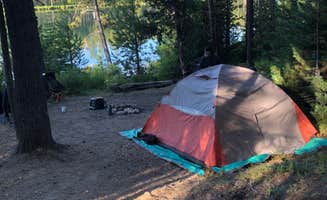Cabin camping in the Tiller, Oregon area offers rustic accommodations within the Umpqua National Forest. Cabins range from historic guard stations to simple shelters along forest service roads. Winter temperatures often drop below freezing at higher elevations, while summer daytime temperatures typically reach 75-85°F with cool evenings in the 40s.
What to do
Hiking to waterfalls: Several trails lead to scenic waterfalls within short distances from campgrounds. Lake in the Woods Campground connects to trails with waterfall views. "The short hike to Hemlock Falls is beautiful and worth it," notes one visitor to Lake In The Woods. Other nearby falls include Mill Creek Falls, which can be accessed via a "good hike for those passing through to go to Crater Lake," according to a camper at Mill Creek Campground.
Fishing in stocked waters: Fishing opportunities abound in local creeks and lakes. "They stock the creek with trout and it's good fishing!" reports a visitor to Mill Creek Campground. Many campsites provide direct water access for convenient fishing spots.
Off-season exploration: Many campgrounds remain accessible during shoulder seasons for visitors seeking solitude. "Stayed here in the off season, and it was beautiful and quiet," shares a Lake in the Woods visitor. Winter camping is possible at select locations, with one camper noting, "winter or summer its gorgeous."
What campers like
Direct creek access: Sites positioned along waterways offer natural water features and ambience. At Mill Creek Campground, campers appreciate being "immersed in the forest right along the creek" with spots that feature "a good amount of flat space for a tent or vehicle."
Seclusion between sites: Many campgrounds provide natural spacing between camping spots. "The marked camping spaces are huge with a lot of space between you and the next closest site," notes a visitor about Lake in the Woods.
Historic accommodations: The Whisky Camp Guard Station offers a unique cabin experience with vintage charm. "The cabin is vintage and takes you back in time. It was clean and comfortable," shares one camper who appreciated this alternative to standard tent sites.
Minimal light pollution: The distance from urban centers creates excellent night sky viewing. "I slept in my car and I think it was the best sleep I've had on this trip. Cool at night, the only sound I heard were the occasional and distant 4th of July fireworks," reports a visitor to the USFS Rogue River Dispersed area.
What you should know
Road conditions: Many access roads are unpaved and require careful driving. The USFS Rogue River Dispersed camping area has "gravel with pot holes but otherwise doable in most rigs," while another camper notes the "bump bump bump" of numerous potholes.
Bring supplies: Most campgrounds require campers to bring all necessities. At Whisky Camp Guard Station, "there is no water so you need to bring your own," and visitors should "bring your own cleaning supplies and bedding."
Cell service limitations: Communication options are severely restricted in this remote region. One camper reports "There is zero cell reception from ATT, T-Mobile or Verizon in this entire area" near the USFS Rogue River Dispersed camping area.
Fire restrictions: Seasonal fire regulations may limit or prohibit campfires, particularly during late summer months. Always check current restrictions before planning to build fires.
Tips for camping with families
Swimming spots: Several locations offer kid-friendly water access. Dumont Creek Campground features water that is "slow but deep, great for kids of all ages. Beach is rocky, not sandy."
Multi-day exploration bases: Several campgrounds provide convenient access to regional attractions. Twin Lakes serves as "an easy shot to Crater Lake or to other activities in the Rogue River valley and the Central Cascades. Rafting for all skill levels, wine tasting, fishing, hiking, rock climbing all a stone's throw away," according to one visitor.
Group camping options: White Creek Campground accommodates larger family gatherings with spacious sites. "White Creek has 4 Sites and the privacy isn't great but if you show up early on Thursday and pay 40 dollars a night you can usually get the whole place to yourself," advises a camper. The campground also features "two beaches, one under a beach. It has a trail that takes you to a cave."
Tips from RVers
Size limitations: Most campsites accommodate smaller RVs but have tight turning areas. At Mill Creek Campground, one visitor noted, "We were pulling a 12' camper and had no problem parking but I wouldn't want to be maneuvering anything larger. Tight corners."
Dispersed options: For self-contained units, forest service roads offer free alternatives to established campgrounds. Near the Rogue River, "There are multiple spots to camp for free just past the River Bridge Campground across the one lane bridge. You can take a right or left after the bridge to find a spot... We took a right and found multiple sites to pull into right off the main forest service road."
Seasonal availability: Most RV-accessible sites operate seasonally, typically May through October. Access outside these months may be limited by weather conditions or seasonal closures.


